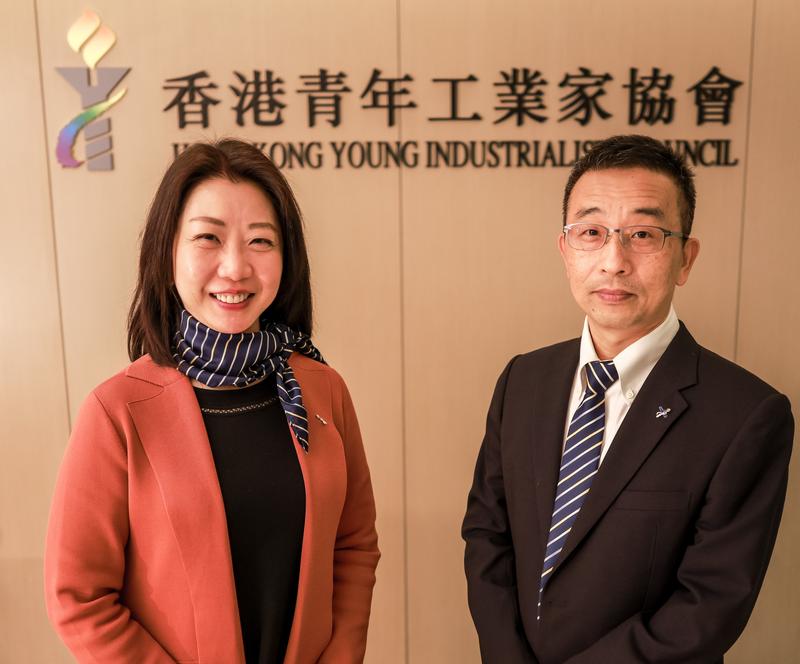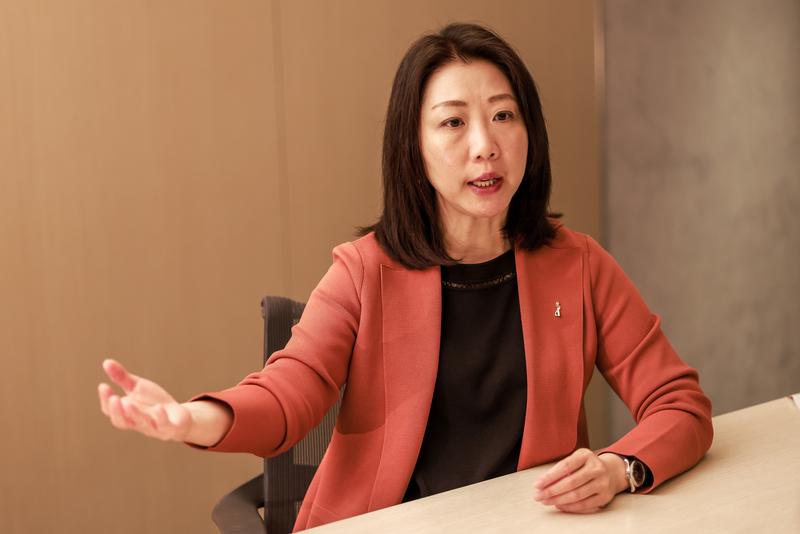 Clara Chan (left), chief executive officer at Lee Kee Group and honorary president of Hong Kong Young Industrialist Council, and Felix Choi, chief executive officer at Hongrita Holdings and vice-president of Hong Kong Young Industrialist Council, pose for a photo during an exclusive interview with China Daily. (ANDY CHONG / CHINA DAILY)
Clara Chan (left), chief executive officer at Lee Kee Group and honorary president of Hong Kong Young Industrialist Council, and Felix Choi, chief executive officer at Hongrita Holdings and vice-president of Hong Kong Young Industrialist Council, pose for a photo during an exclusive interview with China Daily. (ANDY CHONG / CHINA DAILY)
Industrial companies in Hong Kong are diversifying their markets and supply chains to enhance revenue streams, minimize operation risks amid the trend of de-globalization, and tap market potential brought by regional free trade agreements in Asia.
Listed in Hong Kong, Lee Kee Group is a material supplier and producer of various metals, such as commodity zinc, aluminum, nickel, copper, zinc alloys, aluminum alloys, stainless steel and electroplating chemicals, and a brand owner of zinc alloys across more than 20 industries.
Lee Kee’s strengths lie in its integrative capabilities as the company extends to the upper stream of the value chain in the metal industry, including production, research and development (R&D), quality assurance, and testing, as well as technical consultancy.
Lee Kee is the first company in China to be admitted as a Category 5 Associate Trade Member of the London Metal Exchange. Its testing laboratory in Hong Kong is one of the 14 laboratories accredited by the LME, which is qualified to test zinc and aluminum
“Our company believes that as a raw-material supplier, we are not only delivering the material, we also want to ensure that the materials our customers use are in good quality, and sustainably, the products they produce are competitive. That is why we expand into the business segments of technical consultancy and quality assurance and testing,” Lee Kee Group CEO Clara Chan told China Daily.
“Lee Kee is positioned in the market, and our testing facilities and qualities are accredited from the international point of view, helping manufacturers to produce quality products and the manufacturing industries to stay competitive,” Chan said.
Lee Kee is the first company in China to be admitted as a Category 5 Associate Trade Member of the London Metal Exchange. Its testing laboratory in Hong Kong is one of the 14 laboratories accredited by the LME, which is qualified to test zinc and aluminum.
Chan, who is also the honorary president of the Hong Kong Young Industrialist Council (HKYIC), added that the company’s R&D business segment is to improve the durability of different types of metals to fit the standards required by the clients in different industries.
ALSO READ: Business veteran: HK joining RCEP to boost global trade
Lee Kee currently has two production facilities, in Hong Kong and Ningbo. While the production line in Ningbo specializes in mass production of the more-common materials consumed on the Chinese mainland, the Hong Kong production base focuses on the commercialized production of high-value-added alloy, which is shipped to the Chinese mainland or exported to Southeast Asian countries. Automated manufacturing technologies are also applied to monitor product quality and to comply with the sustainability requirement of carbon intensity reduction in the process of making the alloy.
Chan said the company remains open to deciding whether to expand its production sites. “I think we are very open-minded because we want to serve our customers better in terms of availability of the materials and to fit the different requirements in different regions.”
Lee Kee Group has been in the metal business for 75 years. With a total headcount of 190 people, the company has three regional offices, in Malaysia, Singapore and Thailand, to serve its clients in Asia, including Indonesia and Vietnam.
Asked whether Lee Kee will expand the business to North American and European countries, Chan said that the decision depends on the trend of manufacturing activities in the two regions.
“Definitely, I think diversifying into different products or regions or scopes helps improve revenues and remain competitive in the market,” Chan told China Daily.
 Clara Chan, chief executive officer at Lee Kee Group and honorary president of Hong Kong Young Industrialist Council, speaks to China Daily during an exclusive interview recently. (ANDY CHONG / CHINA DAILY)
Clara Chan, chief executive officer at Lee Kee Group and honorary president of Hong Kong Young Industrialist Council, speaks to China Daily during an exclusive interview recently. (ANDY CHONG / CHINA DAILY)
I think Southeast Asia is definitely the region in which we like to expand because we already have our operations, offices and distribution service centers there. But at this moment, we do not have any fixed schedule yet because we are still observing the market situation.
Clara Chan, Lee Kee Group CEO and honorary president of the Hong Kong Young Industrialist Council
She added that the direct benefit of establishing the three regional offices in Southeast Asia is to better serve clients in their respective local markets, and the company will strengthen its operations in Asia if market conditions permit.
“I think Southeast Asia is definitely the region in which we like to expand because we already have our operations, offices and distribution service centers there. But at this moment, we do not have any fixed schedule yet because we are still observing the market situation,” Chan said.
First of all, as a listed company in Hong Kong, the metal supplier will look into the legal and accounting system of the Asian countries to ensure that compliance can be achieved based on the regulatory requirement of Hong Kong when making investments in an Asian country.
“Second, we will examine the feasibility in great detail and study each market carefully before we expand further. When there are opportunities, we will consider and look into every possibility,” Chan said.
The industrial structure of each Asian country will elicit different demands for metals. For example, Thailand’s major specialty lies in targeting automotive customers. Malaysian customers are more interested in household hardware, while Vietnamese clients are mainly hardware or toy manufacturers. “We have to focus on different industries in different regions,” Chan said.
ALSO READ: HK business prospects improve but risks still ahead
“We will also consider the local support offered by the government and the policies or incentives for foreign investment,” she said.
“After all, the world is just going to turn back to normal since the COVID-19 outbreak. Economic activities are resuming, and the company still has time to consider” how business should expand, Chan said.
Apart from the three Southeast Asia regional offices, the company has four mainland offices in Shenzhen, Guangzhou, Ningbo and Wuxi, which are operated by local employees to provide localized service support to the company’s mainland operation.
Looking forward, Lee Kee is eyeing the regional free trade agreements in Asia, such as the Regional Comprehensive Economic Partnership, to boost the company’s business. When there are more regional trade flows, it will stimulate more manufacturing activities and create more demand for raw materials.
“Hong Kong is not part of the RCEP yet. But I think the agreement will facilitate trade flows between the Chinese mainland and ASEAN countries, which is a very important driver in facilitating the regional economies,” Chan highlighted.
The same business expansion journey is also shared by Hongrita Holdings, a manufacturer of precision plastic molds, components and solutions covering industries such as medical and healthcare, automotive and industrial consumer electronics, and packaging.
Looking forward, Lee Kee is eyeing the regional free trade agreements in Asia, such as the Regional Comprehensive Economic Partnership, to boost the company’s business. When there are more regional trade flows, it will stimulate more manufacturing activities and create more demand for raw materials
The company is also looking to diversify their production capabilities while expanding into more overseas geographical markets.
Hongrita’s two mainland manufacturing plants are located in Shenzhen and Zhongshan; the former focuses on consumer electronic products, while the latter specializes in R&D activities.
The third manufacturing site is located in Malaysia to serve the company’s overseas and Southeast Asian clients and diversify business risks. The company chooses Malaysia because it is a multiculturalism country with a very good industrial foundation.
“The manufacturing plant in Malaysia helps boost business performance significantly because it helps attract more customers since trade tensions between China and the United States have flared up,” Hongrita CEO Felix Choi told China Daily.
Choi emphasized that the company’s competitive edges lie in innovation and professionalism. “We strive for our production lines to be more professional and stronger, focusing on certain high-value-added industry segments so that companies will immediately consider Hongrita as their supplier.”
Hongrita will consider establishing another overseas manufacturing site because as Choi put it: “World economies are shifting away from the trend of globalization to regionalization, and setting another production site can better serve our customers of global supply.”
 Felix Choi, chief executive officer at Hongrita Holdings and vice-president of Hong Kong Young Industrialist Council, says the Greater Bay Area has a comprehensive supply chain. (ANDY CHONG / CHINA DAILY)
Felix Choi, chief executive officer at Hongrita Holdings and vice-president of Hong Kong Young Industrialist Council, says the Greater Bay Area has a comprehensive supply chain. (ANDY CHONG / CHINA DAILY)
“We may establish the new manufacturing site in Asia through our own funding. As for other overseas countries, it may take the form of a joint venture ownership structure,” said Choi, who is also the vice-president of HKYIC.
In Choi’s view, the direct benefit of expanding overseas production facilities is that it can complement the manufacturing prowess and supply chains in China. As a result, our company can serve customers better.
“The (Guangdong-Hong Kong-Macao) Greater Bay Area has a comprehensive supply chain. Hongrita can leverage it to commence complex R&D projects in our two production bases and then conduct a technology transfer to the Malaysian manufacturing center,” Choi explained.
World economies are shifting away from the trend of globalization to regionalization, and setting another production site can better serve our customers of global supply.
Felix Choi, chief executive officer at Hongrita Holdings and vice-president of Hong Kong Young Industrialist Council
Based on this complementarity, Hongrita will focus on solutions of small and medium molds and multimaterial mold in the medical and healthcare, automotive and industrial, and consumer electronics segments and so on.
READ MORE: Greater Bay Area savviness boosts foreign business in HK
Apart from the manufacturing facilities in the Chinese mainland and Malaysia, the company's headquarters is in Hong Kong, which is responsible for accounting and finance, some parts of the R&D activities, and marketing. The whole business group has 1,800 employees.
Regarding overseas expansion, Choi also sees the benefit of diversification.
Currently, American and European customers dominate 80 percent of Hongrita’s client portfolio, while Asian customers account for 20 percent only.
“We strive to diversify our client portfolio and hope that Asian customers can make up 30 percent of our portfolio within the coming two years,” Choi said.
Despite the need to diversify the geographical market, Choi maintained that the company strives for innovation and professionalism, aspiring to be the leading global supplier of small and medium molds and multimaterial molds.
“Diversifying the market can reduce risk, but too much business diversification may not benefit the profit performance,” Choi said.
The company also makes business organization structure lean so that it can devote resources to deal with the external business environment and respond to customer needs, the CEO said.
Like Lee Kee’s CEO, Choi also expected regional free trade agreements like the RCEP will brighten the company’s business prospects.
“The RCEP will exert a positive impact on the company because the agreement is poised to slash tariffs in goods trade which will facilitate goods flows and industry complementarity in the Asia Pacific region. The company hence can gain more business opportunities,” Choi said.


